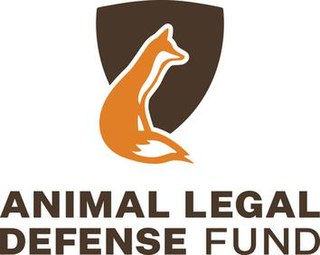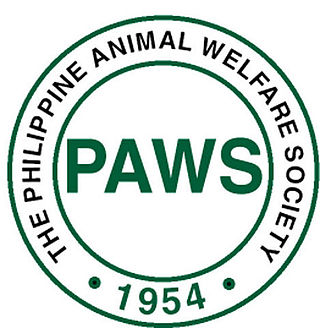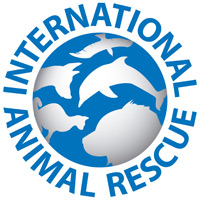
An animal shelter or pound is a place where stray, lost, abandoned or surrendered animals – mostly dogs and cats – are housed. The word "pound" has its origins in the animal pounds of agricultural communities, where stray livestock would be penned or impounded until they were claimed by their owners.

Oliver was a former "performing" chimpanzee once promoted as a missing link or "humanzee" due to his somewhat human-like appearance and a tendency to walk upright. Despite his somewhat unusual appearance and behavior, scientists found that Oliver was not a human-chimpanzee hybrid.

Trap–neuter–return (TNR), also known as trap–neuter–release, is a controversial method that attempts to manage populations of feral cats. The process involves live-trapping the cats, having them neutered, ear-tipped for identification, and, if possible, vaccinated, then releasing them back into the outdoors. If the location is deemed unsafe or otherwise inappropriate, the cats may be relocated to other appropriate areas. Ideally, friendly adults and kittens young enough to be easily socialized are retained and placed for adoption. Feral cats cannot be socialized, shun most human interaction and do not fare well in confinement, so they are not retained. Cats suffering from severe medical problems such as terminal, contagious, or untreatable illnesses or injuries are often euthanized.

Game or quarry is any wild animal hunted for animal products, for recreation ("sporting"), or for trophies. The species of animals hunted as game varies in different parts of the world and by different local jurisdictions, though most are terrestrial mammals and birds. Fish caught non-commercially are also referred to as game fish.

A feral cat or a stray cat is an unowned domestic cat that lives outdoors and avoids human contact; it does not allow itself to be handled or touched, and usually remains hidden from humans. Feral cats may breed over dozens of generations and become an aggressive local apex predator in urban, savannah and bushland environments. Some feral cats may become more comfortable with people who regularly feed them, but even with long-term attempts at socialization, they usually remain aloof and are most active after dusk. Of the 700 million cats in the world, an estimated 480 million are feral.

The Animal Legal Defense Fund is an American animal law advocacy organization. Its stated mission is to protect the lives and advance the interests of animals through the legal system. It accomplishes this by filing high-impact lawsuits to protect animals from harm, providing free legal assistance and training to prosecutors to assure that animal abusers are punished for their crimes, supporting tough animal protection legislation and fighting legislation harmful to animals, and providing resources and opportunities to law students and professionals to advance the emerging field of animal law. In addition to their national headquarters in Cotati, California, the Animal Legal Defense Fund maintains an office in Portland, Oregon.
A no-kill shelter is an animal shelter that does not kill healthy or treatable animals based on time limits or capacity, reserving euthanasia for terminally ill animals, animals suffering poor quality of life, or those considered dangerous to public safety. Some no-kill shelters will commit to not killing any animals at all, under any circumstance, except as required by law. A no-kill shelter uses many strategies to promote shelter animals; to expanding its resources using volunteers, housing and medical protocols; and to work actively to lower the number of homeless animals entering the shelter system. Up to ten percent of animals could be killed in a no-kill shelter and still be considered a no-kill shelter.

Primarily Primates (PPI) is a non-profit organization in Bexar County, Texas, that operates an animal sanctuary, housing 347 non-human primates and a variety of other birds and animals released from use in entertainment, research, or as rescues from the exotic pet trade. The organization was founded by Wallace (Wally) Swett in 1978, who ran the facility until 2006, when the Texas attorney general took control of it after allegations that were dismissed that the facility was an unfit place for animals. It has since been passed to new management, and operates in 2018, with a $1.1 million dollar budget. Primarily Primates employs 16 people for management and care staff, and a full-time veterinarian to assure high standards, excellent animal care and rescue, enrichment, and nutrition.
Best Friends Animal Society, (BFAS) founded in its present form in 1993, is an American nonprofit 501(c)(3) animal welfare organization based in Kanab, Utah with satellite offices in Atlanta, Georgia, Bentonville, Arkansas, Houston, Texas, Los Angeles, California, New York City, and Salt Lake City, Utah. It also has a partnership network with shelters, rescue groups and members in all 50 states and Washington, DC, to promote pet adoption, no-kill animal rescue, and spay-and-neuter practices. Best Friends has a 4-star 'Give With Confidence' rating from Charity Navigator.

The Center for Biological Diversity is a nonprofit membership organization known for its work protecting endangered species through legal action, scientific petitions, creative media and grassroots activism. It was founded in 1989 by Kieran Suckling, Peter Galvin, Todd Schulke and Robin Silver. The center is based in Tucson, Arizona, with its headquarters in the historic Owls club building, and has offices and staff in New Mexico, Nevada, California, Oregon, Illinois, Minnesota, Alaska, Vermont, Florida and Washington, D.C.
Alley Cat Rescue is an international nonprofit organization, headquartered in Mount Rainier, Maryland, that works to protect cats using trap–neuter–return for community cats; rescue, and neuter before adoption; promoting compassionate, non-lethal population control; and by providing national and international resources for cat caretakers.

The Philippine Animal Welfare Society (PAWS) is a volunteer-based, non-government organization whose goal is to prevent animal cruelty through education, animal sheltering and advocacy, based in Quezon City, Philippines. It was founded in 1954 by Muriel Jay. PAWS believes that the creation of a more peaceful society starts with the widening of mankind's circle of compassion which includes animals, thereby envisions a nation that respects animals, practices responsible pet ownership and protects wildlife. The volunteer-based organization rehabilitates these animals in the hope of finding them new homes and a second chance at a good life. PAWS does not take in pets of other people, but only victims of cruelty or neglect where the animal offenders are charged with violation of the Animal Welfare Act in court.

Compassion and Responsibility for Animals (CARA) is a registered non-profit, non-government animal welfare organization in the Philippines. It was founded in 2000 by a group of animal lovers determined to help the plight of animals in the Philippines. The current president of CARA is Nancy Cu-Unjieng.
Population control is the practice of artificially maintaining the size of any population. It simply refers to the act of limiting the size of an animal population so that it remains manageable, as opposed to the act of protecting a species from excessive rates of extinction, which is referred to as conservation biology.

International Animal Rescue (IAR) is a British wildlife protection and conservation non-profit organization. IAR aims to implement strategies which protect and mitigate the threats to wildlife and habitats.
Alley Cat Allies is a nonprofit organization that advocates for reform of public policies and institutions in regard to the humane treatment of all cats. Based in Bethesda, Maryland, the group is best known for introducing trap–neuter–return (TNR) practices to the United States.
Rise for Animals is a national, registered 501(c)(3) nonprofit animal rights organization which aims to end nonhuman animal experimentation. It has been described as "one of the oldest and wealthiest anti-vivisection organizations in the United States".
The North Carolina Animal Protection Act aims to protect pets and their owners in North Carolina. This legislation models the Animal Welfare Act of 1966 and can be found in the North Carolina General Statutes under Chapter 19A: Protection Of Animals, Article 3, consisting of six articles.
Project Bay Cat is a trap-neuter-return initiative for community cats in Northern California.
The International Society for Animal Rights (ISAR), formerly known as the National Catholic Society for Animal Welfare and the Society for Animal Rights, is a nonprofit organization based in the District of Columbia, Washington, D.C. ISAR's mission is to advance animal rights through education and legislation.











